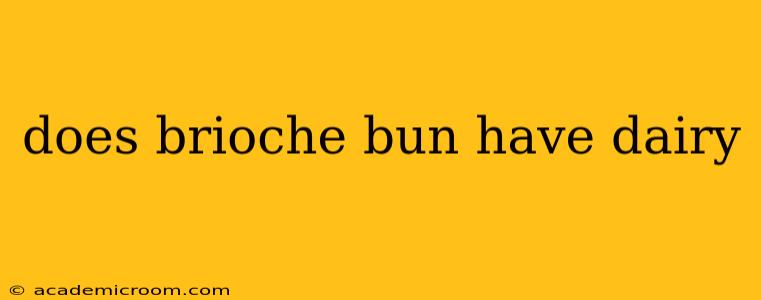Brioche, with its rich, buttery texture and slightly sweet flavor, is a beloved bread for many. But for those with dairy allergies or following a vegan lifestyle, the question arises: does brioche bun have dairy? The short answer is usually yes. However, let's delve deeper into the typical ingredients and explore dairy-free alternatives.
What are the typical ingredients in a brioche bun?
Traditional brioche recipes rely heavily on dairy for their signature richness and tenderness. Key dairy components include:
- Butter: A significant amount of butter is incorporated into brioche dough, contributing to its soft crumb and luxurious flavor. This is often unsalted butter, allowing for better control over the final saltiness.
- Eggs: Eggs act as a binding agent, adding richness and color. They also contribute to the overall structure of the bun.
- Milk or Cream: Many recipes call for milk or cream, which further enhances the moisture and softness of the brioche. This can vary; some recipes might use just milk, while others might opt for heavy cream for an even richer result.
These dairy ingredients are integral to the characteristic texture and taste of brioche. Therefore, a standard brioche bun will almost certainly contain dairy.
Are there dairy-free brioche buns available?
While traditional brioche relies on dairy, the increasing demand for dairy-free options has led to the development of several alternatives. You can find:
-
Commercially produced dairy-free brioche buns: Some bakeries and brands are now producing brioche buns using dairy-free alternatives like plant-based butter substitutes (e.g., vegan butter made from coconut oil, olive oil, or other plant sources) and dairy-free milk (e.g., almond milk, soy milk, oat milk). Check product labels carefully to ensure they are free from dairy and any potential cross-contamination.
-
Homemade dairy-free brioche buns: Many recipes are available online for making dairy-free brioche at home. These usually substitute dairy ingredients with plant-based equivalents. The success of this approach often depends on selecting suitable replacements that mimic the functionality of butter, eggs, and milk. Experimentation might be needed to find the perfect combination.
Always check ingredient lists meticulously, even if a product is labeled "vegan" or "dairy-free," as manufacturing processes can sometimes lead to cross-contamination.
What if I'm allergic to dairy? Can I still eat brioche?
If you have a dairy allergy, it's crucial to completely avoid products containing dairy. Even trace amounts can trigger allergic reactions. Always carefully read labels and, when eating out, inform staff about your allergy to ensure they take necessary precautions to prevent cross-contamination. Opting for clearly labeled dairy-free brioche buns is your safest option.
How can I tell if a brioche bun contains dairy?
Always refer to the ingredients list on the packaging. Look out for words like "butter," "milk," "cream," "whey," "casein," and "lactose," which are all indicators of dairy presence. If you're unsure about a particular ingredient, contact the manufacturer directly to clarify.
What are some good dairy-free butter alternatives for brioche?
Many plant-based butter alternatives are available, each with its own characteristics. Some popular choices include:
- Vegan butter: These are specifically designed to mimic the taste and texture of butter. They often contain coconut oil, palm oil, or other vegetable oils.
- Coconut oil: Can provide a similar richness, but the flavour may be more pronounced.
Remember that experimenting with different dairy-free butter substitutes might be needed to achieve the desired texture and flavor in your homemade brioche.
By understanding the typical ingredients of brioche and the availability of dairy-free options, you can enjoy this delicious bread responsibly, regardless of dietary restrictions. Always prioritize safe food choices, particularly when dealing with allergies.
